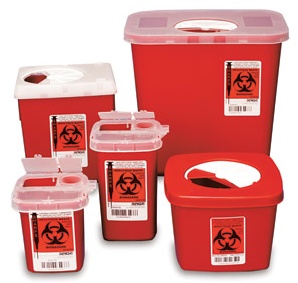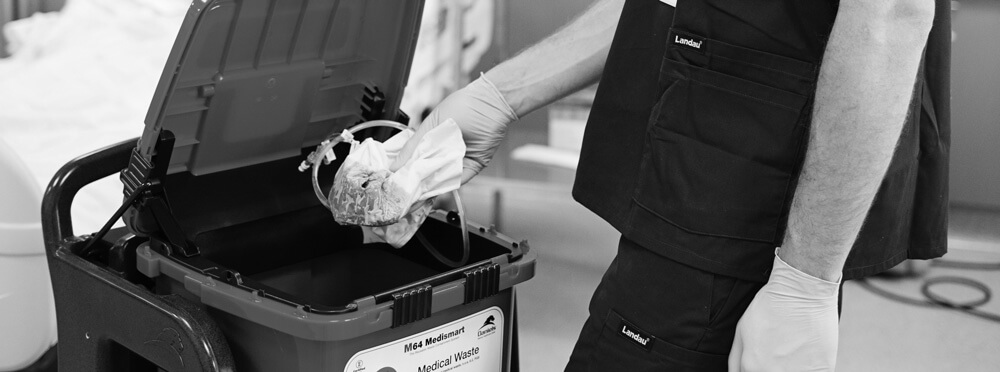Reliable Medical Waste Disposal Services: Partnering for a Cleanser Environment
Reliable Medical Waste Disposal Services: Partnering for a Cleanser Environment
Blog Article
Navigating Medical Waste Disposal: Crucial Services for Health Care Facilities
Medical care centers, whether big hospitals or small centers, are handed over with the responsibility of handling, dealing with, and disposing of a wide variety of medical waste streams. Understanding the necessary solutions that support medical waste disposal is not simply an issue of compliance but additionally a fundamental component in safeguarding public wellness and ecological well-being.
Regulatory Compliance Assistance
For health care centers, guaranteeing regulative conformity assistance is necessary to keep proper handling and disposal of clinical waste. Sticking to policies set forth by organizations such as the Epa (EPA) and the Occupational Safety And Security and Health Management (OSHA) is important to avoid ecological contamination, shield public wellness, and prevent prospective lawful consequences. Regulative conformity assistance gives healthcare facilities with guidance on just how to appropriately set apart, shop, transport, and deal with numerous sorts of medical waste according to neighborhood, state, and federal policies. This assistance consists of aid in creating and executing detailed waste administration strategies, performing routine personnel training sessions, and carrying out audits to make sure continuous compliance. By partnering with regulative conformity specialists, healthcare centers can stay current on evolving laws, minimize risks related to inappropriate waste disposal, and ultimately add to a more secure and extra lasting atmosphere for all.
Waste Partition Advice

Health care facilities should supply clear standards and training to staff on how to segregate waste properly. This consists of dividing basic waste from hazardous materials such as sharps, contagious waste, drugs, and chemical waste. Color-coded containers, tags, and signs are commonly used to help in waste partition methods. Normal audits and surveillance of waste segregation procedures are important to identify any problems and make necessary enhancements.
Collection and Transportation Services

Correct collection and transport services are essential parts of the clinical waste disposal process in health care facilities. These solutions make certain that unsafe materials are handled securely and in compliance with laws to protect both the setting and public health and wellness. Healthcare facilities depend on specialized waste management firms to offer reliable collection and transport services customized to their needs.
Clinical waste collection entails segregating various kinds of waste at the factor of generation, using color-coded bags or bins to compare basic, hazardous, pharmaceutical, and various other waste streams. Trained employees should execute this task to avoid contamination and guarantee appropriate disposal. When gathered, the waste is transported in dedicated cars outfitted to deal with harmful products safely. These automobiles stick to strict security criteria and follow assigned paths to licensed treatment centers for disposal with techniques such as incineration, landfilling, or sterilization.
Therapy and Disposal Solutions
In the world of clinical garbage disposal for health care centers, after the essential stage of collection and transportation solutions, the emphasis shifts in the direction of applying efficient therapy and disposal solutions. Treatment solutions frequently involve processes such as autoclaving, which uses steam under pressure to sanitize the waste. This method is commonly used for infectious waste that has to be provided non-hazardous prior to disposal. Another prevalent therapy approach is incineration, where waste goes through high temperatures in regulated setups to lower its volume and eliminate virus.
Disposal services include the last action in the medical waste administration procedure. Reusing and source recovery are likewise obtaining traction as sustainable disposal options for specific types of clinical waste products.
Effective treatment and disposal services are paramount in making sure compliance with regulations and protecting public health and wellness and the setting. Medical care centers should thoroughly assess and choose suitable techniques that straighten you could look here with their waste monitoring objectives and sustainability campaigns.
Team Training and Education And Learning

To efficiently manage clinical garbage disposal in health care facilities, extensive staff training and education and learning play an essential function in making sure adherence to regulative requirements and maintaining a secure atmosphere. Appropriate training gears up staff with the expertise and skills needed to manage different types of clinical waste, segregate them properly, and package them securely for disposal. By informing workers on the dangers associated with incorrect handling of medical waste, centers can reduce the possibility of accidents, contamination, and governing violations.

Conclusion
In verdict, healthcare facilities rely upon vital clinical garbage disposal solutions to guarantee regulatory compliance, proper waste segregation, safe collection and transportation, effective treatment and disposal, along with team training and education and learning. These services play an essential role in maintaining the health and wellness of both medical care employees and the basic public, highlighting the relevance of correct monitoring of clinical waste in health care settings.
For health care facilities, ensuring governing conformity support this is vital to preserve appropriate handling and disposal of clinical waste. Waste segregation entails categorizing various types of medical waste to make certain proper handling, therapy, and disposal. This includes dividing general waste from unsafe products such as sharps, transmittable waste, drugs, and chemical waste.Medical waste collection involves setting apart various kinds of waste at the point of generation, making use of color-coded bags or bins to identify in between general, hazardous, pharmaceutical, and various other waste streams.In the realm of clinical waste disposal for health care facilities, after the critical stage of collection and transport services, the emphasis moves towards implementing reliable treatment and disposal remedies.
Report this page